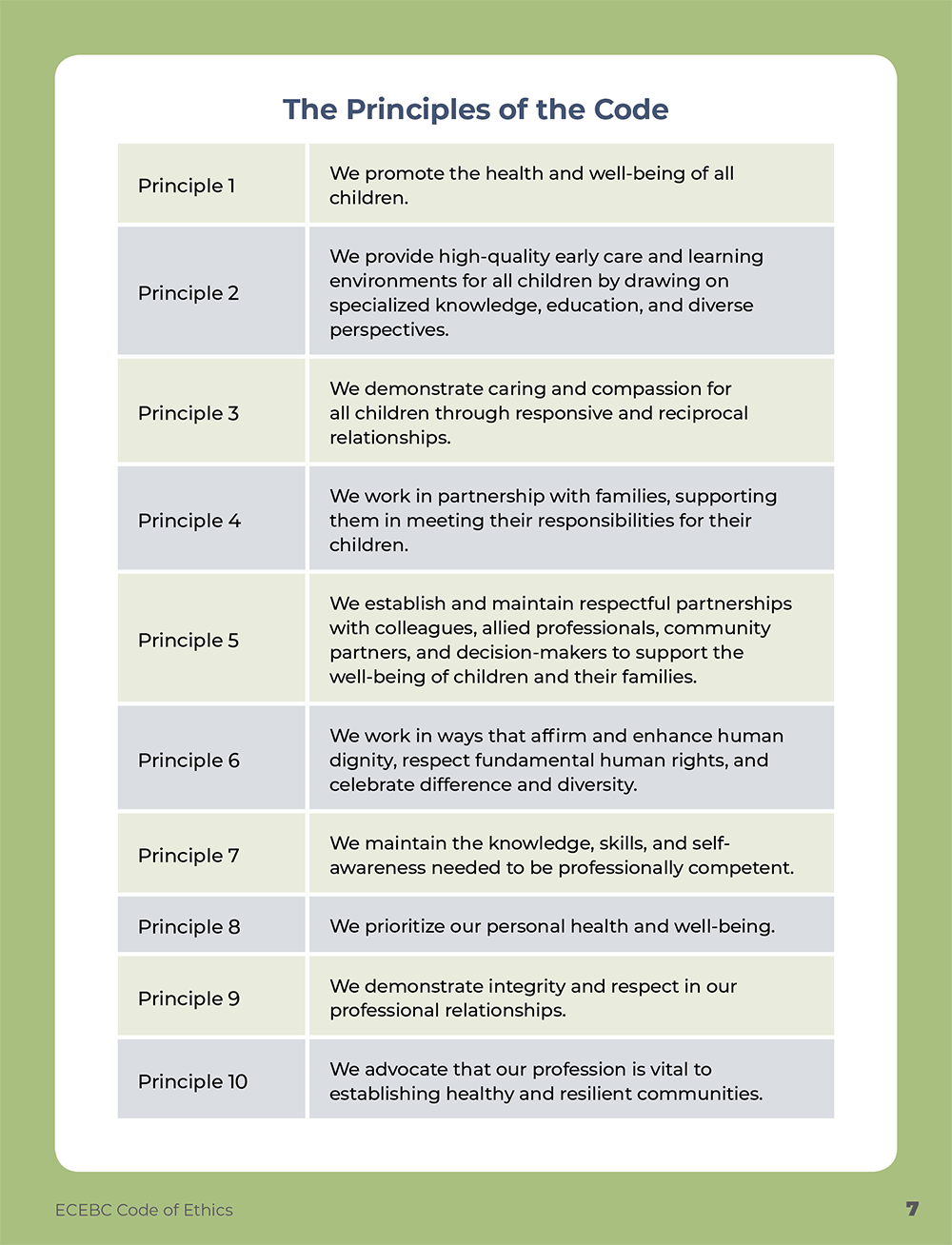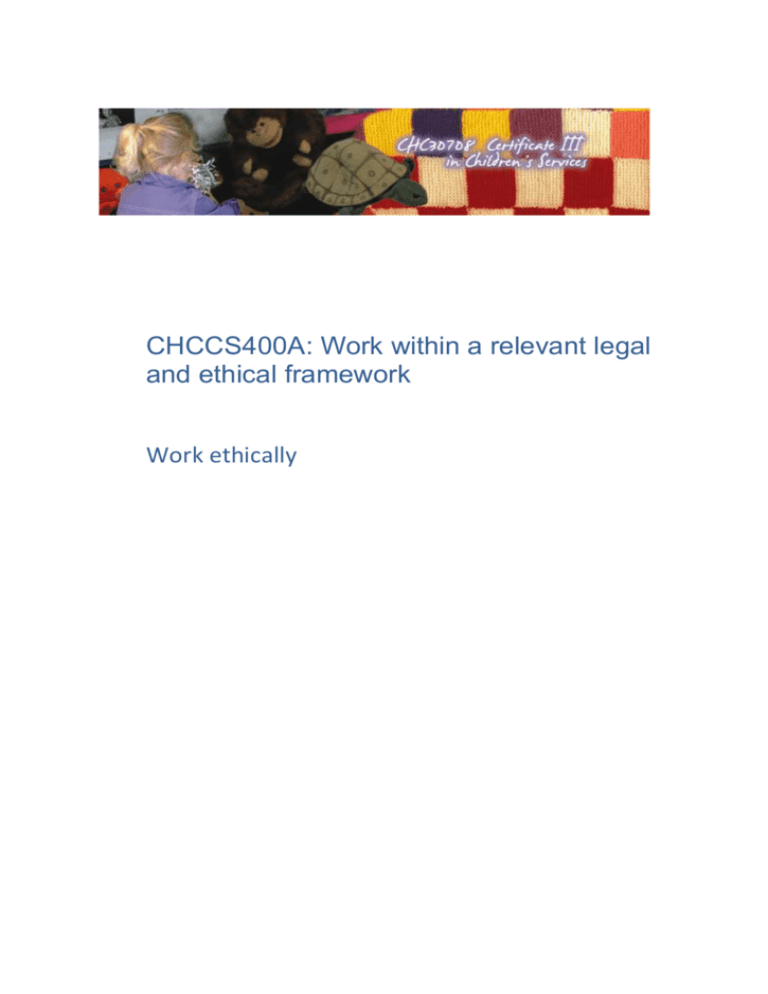
Code of Ethics Poster Early Childhood Australia Shop
The Code of Ethics poster in clear full-coloured print is suitable for display on notice boards in childcare centres and early childhood training environments. New webinar available now | Catharine.

Code of Ethics Poster Early Childhood Australia Shop
Code of Ethics Brochure. $ 2.00. The ECA Code of Ethics provide a framework for reflection about the ethical responsibilities of early childhood professionals who work with or on behalf of children and families in early childhood settings. It reflects current pedagogical research and practice, providing a framework for reflection about the.

ECEC Code of Ethics by Early Childhood Australia by Australia Flipsnack
The development of the AECA Code of Ethics has been a significant achievement for the field of early childhood in Australia. Importantly, it has placed ethical issues on the agenda and provided a language and framework in which to publicly raise and discuss ethical concerns. However, codification is only one approach to raising ethics awareness.

ECA Resources Early Childhood Australia Shop
The Code of Ethics poster sets out the ECA Code of Ethics in clear print and is suitable for display on notice boards in early childhood centres and early childhood training environments.The Code of Ethics Poster can be purchased here. Also available: Ethics in Action: A practical guide to implementing the ECA Code of Ethics.

Code of Ethics A1 poster Early Childhood Australia Shop
The ECA - Code Of Ethics is designed especially for early childhood services and based on the principles of the United Nations Convention on the Rights of the Child (1991). They reflect current pedagogical research and practice, providing a set of statements about the ethical responsibilities and expected behaviour of early childhood.

ECA Early Years Planner Early Childhood Australia Shop
The Code of Ethics - Early Childhood Australia EN English Deutsch Français Español Português Italiano Român Nederlands Latina Dansk Svenska Norsk Magyar Bahasa Indonesia Türkçe Suomi Latvian Lithuanian český русский български العربية Unknown

Early Childhood Australia, Code Of Ethics, Early Education, Children And Family, Framework
early childhood professionals who work with or on behalf of children and families in early childhood settings. In developing this second edition of Early Childhood Australia's Code of Ethics, the national working party was mindful of changes in the knowledge base of early childhood that have occurred over the last decade. New research has allowed

Pin by KatieConor Dermody on Daycare 2 Early childhood australia, Early childhood, Childhood
Interact with children in ways that enhance their development and competencies and value their achievements. Identify, value and build upon each child's competencies. Advocate on behalf of children. Advocate for the abilities and strengths of each child irrespective of diagnosis and/or prognosis. Create and maintain safe, healthy and.

No Jab, no p(l)ay The ethics of vaccination for early childhood educators
used for 19 years. The first review of the Code of Ethics began in 2003 with the second version launched in 2007. The second review of the Code of Ethics began in 2014 with the third (current) version approved by the ECA National Board in February 2016. ECA is grateful to everyone who has contributed to the development and ongoing review of the.

Code of Ethics Early Childhood Educators of BC
Respectful, responsive and reciprocal relationships are central to children's education and care. Play and leisure are essential for children's learning, development and wellbeing. Research, inquiry and practice-based evidence inform quality education and care. Identify two core values that underpin the way you work.

Early Childhood Australia`s Code of Ethics
… educators and staff are collaborative, respectful and ethical.This case study is a collection of examples of high. This conversation brought educators back to their staff code of conduct as well as OSHC Professional Standards .. to a discussion about the Early Childhood Australia Code of Ethics, where educators debated the extent to which they.

Code of Ethics A1 poster Early Childhood Australia Shop
This essential and practical 95-page guide to the Early Childhood Australia (ECA) Code of Ethics clearly explains what 'code of ethics' means in everyday practice. You will discover case studies, scenarios and provocations to help guide you with everyday ethical implementation. Developed from the early learning and care sector's desire to.

Code of Ethics Early childhood australia, Early childhood education resources, Early childhood
Ethics in Action: Important Purchase Information. We noticed that you have added 'Ethics in Action - A Practical Guide to Implementing the ECA Code of Ethics' to your shopping cart. We wish to inform you that in alignment with our commitment to sustainability, this publication is now provided without a plastic cover as a standard.

ECA COE Brochure 2016 Code of Ethics Early Childhood Australia recognises that Aboriginal and
Early Childhood Australia (ECA) Code of Ethics (the Code) invites childhood professionals to reflect deeply on the values, principles and commitments that underpin their understanding of children, families and their work in education and care. The Code stands as a source of personal inspiration and reflection. It is also a powerful resource

Early Childhood Australia Code of Ethics School of education, Early childhood australia
This essential and practical 95-page guide to the Early Childhood Australia (ECA) Code of Ethics clearly explains what 'code of ethics' means in everyday practice. You will discover case studies, scenarios and provocations to help guide you with everyday ethical implementation.. Code of Ethics Poster $ 30.25 $ 24.20 Member Price Add to.

ECA's Code of Ethics principles Early Childhood Australia Code of ethics, Early childhood
7. Mentor other early childhood professionals and students. 8. Advocate in relation to issues that impact on my profession and on young children and their families. 9. Encourage qualities and practices of leadership within the early childhood profession. VI. In relation to the conduct of research, I will: 1.
- The Sound Of Music Melbourne 2024
- Vehicle And Traffic Act 1999
- Opera Bar New Years Eve Tickets
- The Ashley Mckenzie Aged Care
- Tomorrow When The War Began Themes
- 7 Prayers Of St Bridget
- Waterfront Retirement Villages Brisbane
- Flights From Copenhagen To Bergen Norway
- Coffs Cup 2023 Public Holiday
- Painted Hills In Wheeler County Oregon
